The University of Washington research will investigate the effects of second-hand drug smoke on and around transit across the Pacific Northwest
As the rampant rise in illicit fentanyl use fuels a public health crisis across Oregon, TriMet has begun working with researchers and other transit agencies to better understand its impacts. Researchers from the University of Washington are beginning a study to detect, monitor and assess the effects of second-hand fentanyl smoke on and around transit systems. TriMet, alongside University of Washington researchers, Sound Transit in the Seattle metro area and other transit agencies, will use the findings to determine new best practices around addressing drug use.
With illicit fentanyl surging—evidenced by Oregon’s 41% increase in overdose deaths in 2021—use of it has occasionally spilled over to shared spaces, including public transit. By better understanding the second-hand exposure levels of smoked substances, such as illicit fentanyl and other opioids like heroin, TriMet hopes to determine ways to better understand and curb the risks associated with them.
As of right now, there is little in the way of concrete data about the health effects of second-hand fentanyl smoke or its impacts on a self-contained area, like a bus or train. While there have been studies about the risk of exposure to first responders, this is the first study of its kind to delve into public transit.
No smoking allowed
Smoking is not allowed on TriMet, whether in our buses or trains, or on rail platforms, at transit centers or in elevators. Those caught smoking face a citation or exclusion. Smoking covers everything from tobacco, to electronic cigarettes and vape pens, to any other smoking substance.

To further discourage smoking, particularly smoking drugs on our transit system, in early 2022, we changed the TriMet Code to include non-criminal violations of laws or ordinance as actions prohibited on TriMet. Since possessing a small amount of drugs and drug use, are now categorized as a violation under Oregon law (ORS Chapter 153), by prohibiting violations to those activities, TriMet supervisors can further address the behavior, with a citation or exclusion, rather than needing to call in police. This supports our efforts to reimagine public safety on transit by ensuring a safe system for all without always relying on a police response.
Airing out vehicles when fumes noted
To help address the issue of second-hand drug smoke before a study could be conducted, TriMet enacted our own process in April 2022, to safeguard our riders and operators. Since then, operators have been stopping trains and buses whenever there is a report of smoking or smoke fumes on board, whether the source is known or unknown and whether it smells like drug smoke or not. Operators then open the doors for a period to ventilate the vehicle before it continues in service.
If you smell something strange or noxious, or if you believe a substance was smoked on your train, notify your operator. You can do this by locating the operator intercom box and pressing the red button. Your report will be passed along to our Operations Command Center, and a Supervisor will be dispatched to the train when it stops at the next station.
Science-driven approach
Science will drive our approach as we work in the coming months in partnership with the University of Washington, Sound Transit, other participating transit agencies and the Amalgamated Transit Union, which represents TriMet’s frontline employees. With reports of illicit fentanyl use spiking in communities across the country, the research could set an example for all public transit agencies industry wide.
The new research will partially rely on air samples collected by devices strategically placed on buses and trains. Researchers will also use sampling kits to determine whether the substance smoked was an opioid or something else. TriMet operators, supervisors and other frontline staff do not have the ability or the expertise to determine with accuracy whether fumes are coming from illicit fentanyl or another source.
Expanded police missions, more Safety Response Team members
At TriMet, we believe in taking a comprehensive approach to issues that affect our system. We plan to continue this approach in the future by adding to the personnel you see on or around the transit system. In September, TriMet’s Transit Police Division began expanding its public safety missions to more stations and neighborhoods, following positive feedback from the community, transit riders and TriMet employees.
We’ve also more than doubled the number of staff on our security teams over the past 15 months, with more growth planned in the coming year. Our Customer Safety Supervisors, TriMet staff who conduct code enforcement including no smoking and having valid fare, will increase to at least 46 this year. Our contract Transit Security Officers and Customer Security Officers now number more than 175. And, our Safety Response Team that connects people on and around our transit system with social services, provides first aid and reports serious concerns to emergency responders, will expand to 60 members this year. By using a comprehensive approach, working closely with regional partners and better understanding the scope of drug-related issues, we hope to keep the system safe and welcoming for all.
